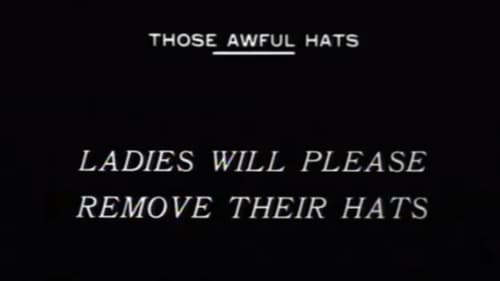Protect and Survive (1976)
Genre : Animation, Documentary
Runtime : 48M
Director : Bill Stewart
Synopsis
Protect and Survive was a public information series on civil defence produced by the British government during the late 1970s and early 1980s. It was intended to inform British citizens on how to protect themselves during a nuclear attack, and consisted of a mixture of pamphlets, radio broadcasts, and public information films. The series had originally been intended for distribution only in the event of dire national emergency, but provoked such intense public interest that the pamphlets were authorised for general release.

A pair of young ladies cause trouble at the cinema with their lavish hats.

Julien Temple's wartime documentary parody "Punk Can Take It" (1979) - a theatrically released promo for the UK Subs, complete with narration by BBC voice-over veteran John Snagge - paints a glorious picture of England in a punk rock "identity crisis". Punk morale was higher than ever before. Punks were fused together not by fear, but by a surging spirit of revenge, immortality, and the courage never to submit or yield. This proved that punk won't go away and that punks themselves are becoming younger and nastier everyday. They have no time for the precarious thrills of nostalgia nor for its trivial rules.

Sonny Bono appears onscreen to tell kids that marijuana is a "bummer" that turns you into a "weedhead" and will make you "trip out" (the fact that, based upon his performance, Sonny appears to have ingested unknown substances before the cameras started rolling tends to limit the film's crediblity somewhat).

An instructional short aimed at school-aged children of the early 1950s that combines animation and live-action footage with voice-over narration to explain what to do to increase their chances of surviving the blast from an atomic bomb.

The dangers of drug use by teenagers are illustrated by showing how well-dressed, happy teens are turned into slovenly, long-haired, drug-addled potheads who don't know that, according to the film's drug expert, “in high dosages, it [marijuana] parallels LSD.”

Thud and Blunder learn what not to do while in a coal mine.

A group of women in a techno-metallic world are using pleasure machines... and condoms.

On an English farm, six reckless children play at being a fierce band of Apache warriors, unaware of the many dangers to which they are exposed. (Public information short film produced on behalf of the British Government to warn children living in rural areas about the risks of playing near farm machinery.)

Animated public information film from the Health and Cleanliness Council.

A dog on holiday is shocked to discover his kennel has been burgled. He learns about the ways in which he can protect his home through the Good Neighbours Scheme.

3 cartoons were made in 1918 by O'Galop, the designer of Bibendum Michelin, to warn the post-war population of the ravaging effects of alcohol and tuberculosis. This public health campaign seems far removed from our present-day concerns. Over time it has acquired a different dimension.

Produced by the Highway Safety Foundation in 1964, this shocking film deals with a subject quite taboo for its time. The short serves as a dramatized warning, ending with graphic case studies.

This one is another warning to the French public about the dangers of alcohol. Everything seems rosy at first, but that doesn't last long. After illustrating the 'metamorphosis of money' into alcohol, the film describes the inevitable consequence - which isn't just drunkenness and unconsciousness, but insanity and death apparently.

A short film warning the unaware housewife of the dangers of “dry cleaning” with gasoline at home.

A husband sneezes inconsiderately all over the place, until his wife has had enough and leaves him.

Lewis Carroll's 'Alice' stories are used to explain certain sections of the Labelling of Food Regulations 1970.

The penalties of taking conscious risks are emphasized in three stories of casualties. A heavy load slips, a slippery floor, alighting from a moving tractor. Third in series.

Protect and Survive was a public information series on civil defence produced by the British government during the late 1970s and early 1980s. It was intended to inform British citizens on how to protect themselves during a nuclear attack, and consisted of a mixture of pamphlets, radio broadcasts, and public information films. The series had originally been intended for distribution only in the event of dire national emergency, but provoked such intense public interest that the pamphlets were authorised for general release.

A chain-smoking woman has an encounter with a vampire.

"Our Cities Must Fight" is a civil defense film that was produced for the U.S. government to illustrate the importance of not abandoning urban centers during an atomic bombing. The film cautions that doing so would make it easier for the invading "enemy."






